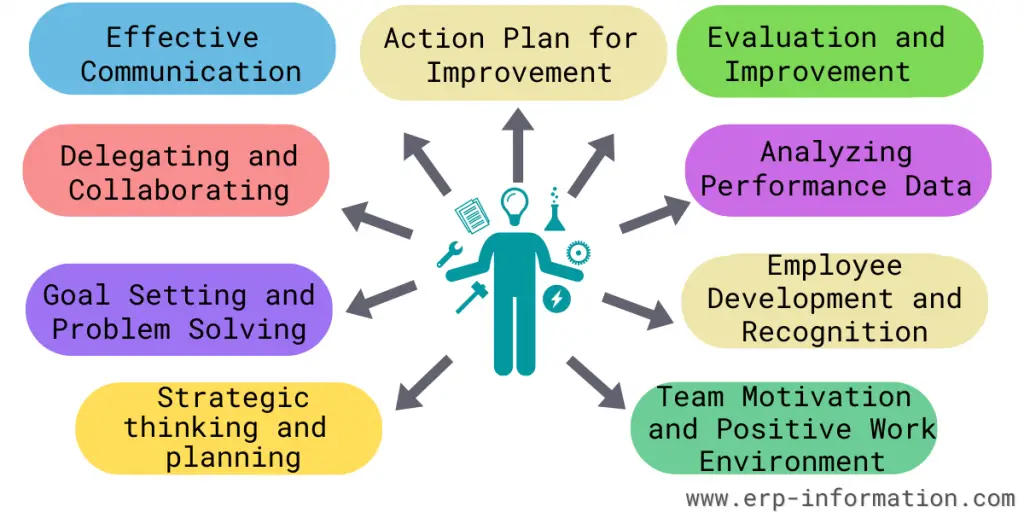A good supervisor leads and nurtures a team to collaborate amongst each other and with other workforces and motivates team members to finish work by the target dates.
For an organization, persons with good supervision skills would be a blessing as they help establish a healthy work environment.
This blog post discusses supervisory skills and their importance, discloses the qualities of good supervision, and shows that a manager or professional can grow professionally with good supervision.
Definition of supervisory skills
Supervisory skills are soft skills necessary for managers to guide and organize their teams effectively. The strength of a supervisor lies in gaining the trust and respect of team members and others.
Therefore, good supervision skills are a must for managers to hone their leadership abilities and perform well to achieve good organizational results.
These skills are generally considered soft skills because they involve direct communication between managers and employees.
The importance of supervisory skills
Supervisory skills are some essential people skills to accomplish the role of a good supervisor. It involves leading a group of people and bringing a sense of coherence to their work to solve problems and achieve the set goals.
Good supervision skills and captainship over fellow team members and other staff members are bulwarks of an organization.
Knowledge of certain primary supervisory skills to gain the confidence of peers and team members helps better interaction among them to make sound decisions. Some factors which highlight the importance of supervisory skills for managers:
- Helps in establishing confident and productive work environments
- To promote brainstorming, analytical thinking, and ingenuity in the workforce
- Managing members based on their strengths and keeping them focused
- Ability to encourage, care and empathize with employees to manage their needs
Qualities of good supervision
A supervisor is someone who takes up responsibility for the team and manages it productively. Therefore, they need to possess some qualities of good supervision to carry out their jobs competently, like :
Effective communication
A good supervisor must have expertise in both oral and written communication skills. The clarity in conveying messages and instructions to employees regarding the work and organization is an important thing. So listening skills for giving feedback and guidance are also equally important.
Delegating and collaborating
Supervision of the team operations is quite a task that involves assigning workload and giving directions to carry forth accordingly for the employees. It also involves collaborations with in-house and outside groups, which requires good interpersonal skill sets.
Goal-setting and problem-solving
Organizing and scheduling to meet the organization’s deadlines are top qualities of good supervision. However, time management to balance all the tasks and operations of the team along with the self-tasks is a challenge that needs to be achieved.
Managerial skills must also include problem-solving and crisis management capabilities to resolve any difference of opinions arising between coworkers and also in case of any mishaps occurring in the organization to create an amicable atmosphere.
Strategic thinking and planning
The decision-making process can be carried out easily with strategic or critical analysis of decisions. Working with different people and performing different duties calls for serious discussions and deliberations to make the right decision.
Also, effectively managing all responsibilities is required. Organizing the workload and assigning personnel to projects according to the organization’s priority list is crucial to fulfilling goals efficiently.
Team motivation and a positive work environment
Maintaining positivity in a team helps inculcate confidence and enthusiasm among the members. Overcoming challenges with the right mindset and optimism helps build the team’s trust and motivates them to do the same.
In addition, mentoring helps convey ideas and guidance to assist the team members, helping them perform better.
Employee development and recognition
Building a good rapport with team members and understanding their strengths and aspirations is essential. In addition, employee development and goal setting are needed to help the employees figure out their flaws and work on them.
Having a contented team ready to achieve the set goals is good work from the supervisor. In addition, rewards and recognition to appreciate their contribution are noteworthy.
Analyzing performance data
Each team member requires a unique set of rules to follow, advice, and motivation to perform their best. Feedback and guidance are the keys here. This is where performance management by the supervisor will aid in improving employee performance, profiting the organization.
Evaluation and continuous improvement of supervisory performance
Peer reviews of performance and functioning help in improving. In case of facing issues that are not in the supervisor’s foray, suggestions and guidance from fellow associates should be considered. An onboard advisor or consultant would help in keeping a check on problems.
Developing an action plan for improvement
A good supervisor is always in learning mode, trying to find any avenue to finetune their skill sets and acquire knowledge. Learning about the latest in the field of work and growing career-wise is the mantra. Also, sharing this new knowledge with others is another trait of a good supervisor.
List of some universities in the USA offering courses and degrees in supervisory skills development
- University of Wisconsin: Milwaukee: Masters in Administrative Leadership and Certificate in Administrative Leadership
- University of Toledo: Doctor of Education in Administration and Supervision, Educational Specialist degree in Administration and Supervision
- University of Southern Utah: Master of Education Degree and an Educational Leadership License
How to improve supervisory skills?
Below are some tips to improve supervisory skills.
Self-Assessment for Skill Prioritization
Begin by conducting a thorough self-assessment to identify your strengths and areas that require improvement. Rank your skills from most proficient to least, emphasizing a personalized understanding of your supervisory capabilities.
Collect Feedback for Targeted Growth
Seek feedback from your team or fellow leaders to gain valuable insights into areas that may need enhancement. Constructive input can pinpoint specific supervisory skills that would benefit from development, fostering a targeted and impactful improvement strategy.
Cultivate a Mentor Relationship
Establish a mentorship with an experienced leader in your field. A mentor can provide invaluable guidance, sharing insights and practical wisdom gained from their own experiences. This relationship offers personalized advice on skill development, such as conflict resolution techniques, based on real-world scenarios.
Utilize Personalized Skill-Building Tips
Leverage mentorship advice and other resources to tailor a skill-building plan that suits your unique needs. For instance, if time management is a challenge, adopt specific techniques recommended by your mentor or other experts to enhance your efficiency and organizational skills.
Implement Progressive Learning Approaches
Continuously measure your progress through strategic assessments. If improvement is stagnant, consider adjusting your approach. For communication skills enhancement, initiate a feedback mechanism, such as surveys, allowing your team to provide insights on your current communication style and monitor improvements over time.
Iterative Skill Refinement
Embrace an iterative process of refinement. Periodically reassess your supervisory skills, adapting your strategies based on measurable progress. This iterative approach ensures ongoing growth and prevents stagnation in your development journey.
Cultivate Trust Through Empowerment
Encourage your team to step beyond their comfort zones and embrace new possibilities. Empower them to think innovatively, fostering a culture of continuous improvement and creativity under your leadership.
Demonstrate Reliability
Become the go-to person your team can rely on when expertise is crucial. Empower your team to take risks, assuring them that you’ll provide support when needed. This trust allows your team to explore new avenues, confident in your backing.
Ownership of Accountability and Recognition
Take responsibility when things go awry and generously give credit where it’s due. Publicly acknowledge and appreciate the contributions of your team members, highlighting their significance in the organization’s success. This reinforces a culture of shared accountability and recognition.
Foster Openness through Information Sharing
Build trust by keeping your team informed about company developments, both positive and challenging. Transparency creates an environment of openness and honesty, nurturing trust and loyalty among team members. Sharing information demonstrates your commitment to a collaborative and informed workplace culture.
FAQ
What is a Supervisory employee?
A supervisory employee is an individual within an organization vested with the power to make significant decisions regarding hiring, transfers, suspensions, layoffs, recalls, promotions, terminations, task assignments, rewards, or disciplinary measures for other employees. This authority extends to addressing grievances and making recommendations, provided that such decisions require the application of independent judgment and are not of a routine or clerical nature.
Conclusion
Supervisory skills help managers carry out their jobs effectively. A good supervisor should be a good leader, inspiring the team and creating a harmonious work culture in an organization.
The necessary skills and qualities of a good supervisor discussed in the blog are a must for every employee to acquire as they provide the support and help to take that lead in their careers.

